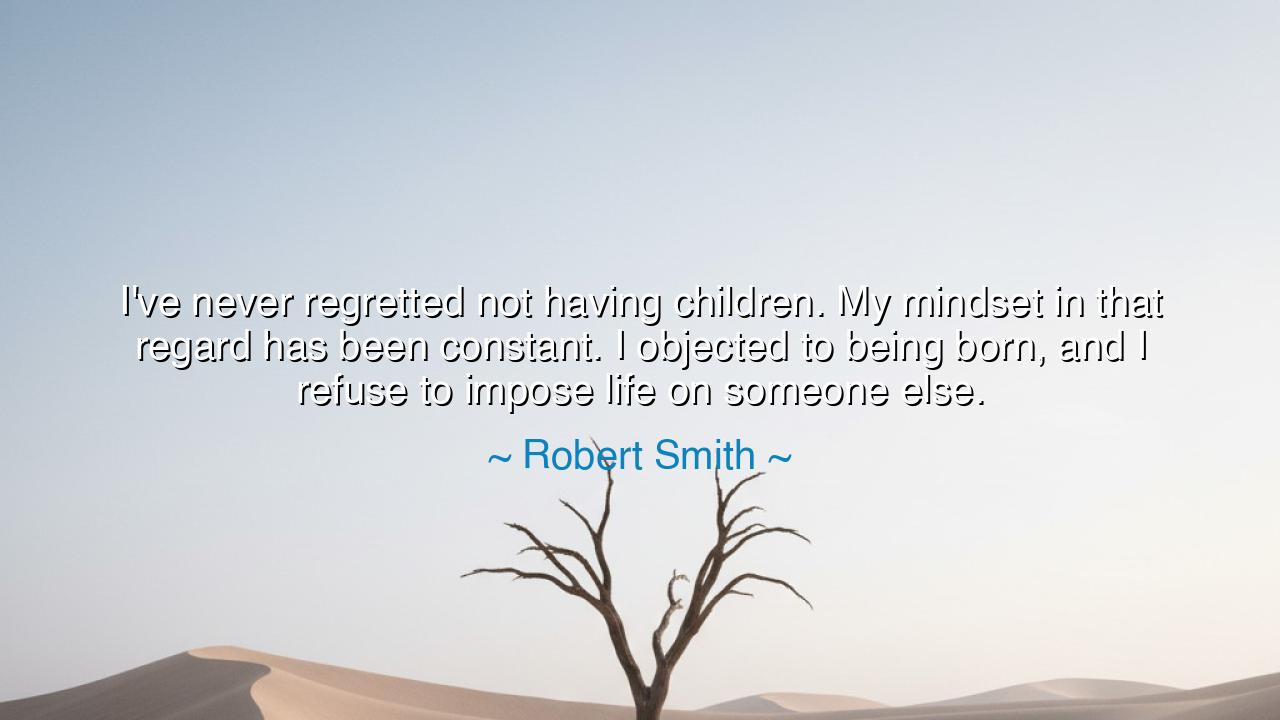
I've never regretted not having children. My mindset in that
I've never regretted not having children. My mindset in that regard has been constant. I objected to being born, and I refuse to impose life on someone else.






Robert Smith, poet of shadows and singer of sorrow, once declared with solemn conviction: “I've never regretted not having children. My mindset in that regard has been constant. I objected to being born, and I refuse to impose life on someone else.” In these words burns a philosophy both haunting and profound: that existence itself is not always a gift, and that to bring another being into the world carries a burden too grave for some to accept. His statement is not bitterness alone, but an act of responsibility, a recognition that creation is not to be taken lightly.
The ancients also wrestled with this thought. The Greek tragedians spoke of the curse of existence, how men are born to suffer and die, how even kings cannot escape fate. In the Oedipus at Colonus, the chorus once sang: “Not to be born is best of all.” These were not the words of despair alone, but of recognition: life is filled with sorrow, and to call forth new life is to condemn another soul to that inevitable cycle of joy and grief. In this way, Robert Smith stands in the lineage of those who see existence as a double-edged sword—precious, yet heavy with pain.
Consider the story of Arthur Schopenhauer, the philosopher who looked upon life and declared it full of striving, frustration, and suffering. He, too, believed that to impose life upon another was to impose burden without their consent. Though his thoughts were controversial, they carried a strange honesty: the recognition that to create is not always noble, if one has not first reconciled with the harshness of existence. Smith’s words echo this same spirit—an ethic born not of hatred for humanity, but of reverence for the seriousness of life.
And yet, others have walked the opposite path. Victor Frankl, who endured the horrors of the concentration camps, still declared life meaningful even amidst suffering. He taught that though man is thrown into existence without choice, he can choose his response, and thereby transform suffering into purpose. His children, his teachings, his legacy—these stand as proof that even in the darkest soil, life may bloom. In this contrast lies the great human dialogue: some refuse to impose life for fear of its burdens, while others embrace life in spite of its suffering, hoping to transform it.
The meaning of Robert Smith’s words, then, is not a universal law but a personal testament. It is a vow of restraint, a recognition of his own truth. He saw his existence as objectionable, perhaps too cruel to bestow on another. But within this stands an ethic of responsibility: he did not follow the path expected by society; he chose instead to remain true to his conscience. There is a kind of heroism here—quiet, defiant, and solemn.
The lesson we may take is this: the choice to create life is sacred. It must not be made lightly, nor from pressure, nor from blind tradition. To bring forth a child is to shape destiny, to hand another soul into a world both wondrous and cruel. If one cannot embrace that task with joy, then to refrain is no failure, but an act of honesty. The ancients would say: to know oneself is the beginning of wisdom. Smith knew himself, and chose accordingly.
Practical actions follow. Reflect deeply before creating life. Ask yourself: Do I bring a child into this world out of love and readiness, or out of fear and duty? Honor those who choose differently than you, for each path is born of conscience. And above all, live responsibly with the life you have—whether or not you pass it on—by seeking meaning, compassion, and truth. For in the end, to live with integrity is to leave a legacy, even without descendants.
O seeker, remember Robert Smith’s words: to object to one’s birth is not to despise existence, but to see its weight clearly. To refuse to impose life is not weakness, but a kind of fierce respect. Whether you choose to bring forth children or not, do so consciously, reverently, with eyes wide open. For in the end, the greatest calling is not merely to create life, but to live your own life fully, truthfully, and with unwavering integrity.






AAdministratorAdministrator
Welcome, honored guests. Please leave a comment, we will respond soon